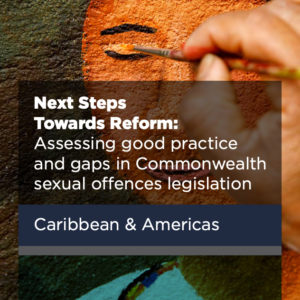Free and voluntary consent is required. The legislation should expressly define consent to require free and voluntary agreement to sexual activity. The law should also explicitly recognise that there are circumstances in which genuine consent cannot be given. These circumstances should be listed in the legislation in a non-exhaustive list.
Most sexual assault laws in the Commonwealth do not define ‘consent’ at all, merely stating that rape is sexual intercourse without consent or with the use or threat of force, or when a person was deceived into sexual intercourse (the perpetrator impersonates the victim/survivor’s husband), or when the victim/survivor was incapable of understanding the nature of the act due to their age or impairment. Some countries include a longer list of circumstances where there can be no consent including for example:
- where the perpetrator took advantage of, or created a coercive situation, such as use or threat of force or the exercise of coercive control in cases of domestic violence or unlawful detention;
- where the victim/survivor cannot give free and voluntary consent because they were a child, asleep, unconscious, physically immobilised or restrained, incapacitated by alcohol or drugs, or by a temporary or permanent illness, disability or impairment that prevents them from giving free and voluntary consent or with limited or no capacity to communicate their consent or non-consent;
- where the perpetrator was in a position of trust or authority in relation to the victim/survivor, or the victim/survivor was under the care and/or control of the perpetrator.
Where such lists exist in the law, they are not evaluated.
This research does not address the defence of reasonable or honest but mistaken belief as to consent. This defence is an important safeguard of the rights of an accused person. However, good practice requires the rights of the accused to be balanced with the rights of a complainant. For this reason, where this defence is available, sexual offences laws should expressly require a defendant to show they took reasonable steps to confirm that the person was consenting to the sexual activity. This defence should not be available in circumstances in which the law presumes consent cannot be given, such as those outlined above.



